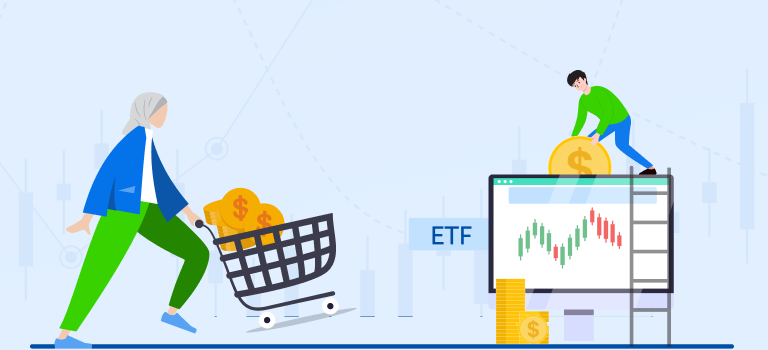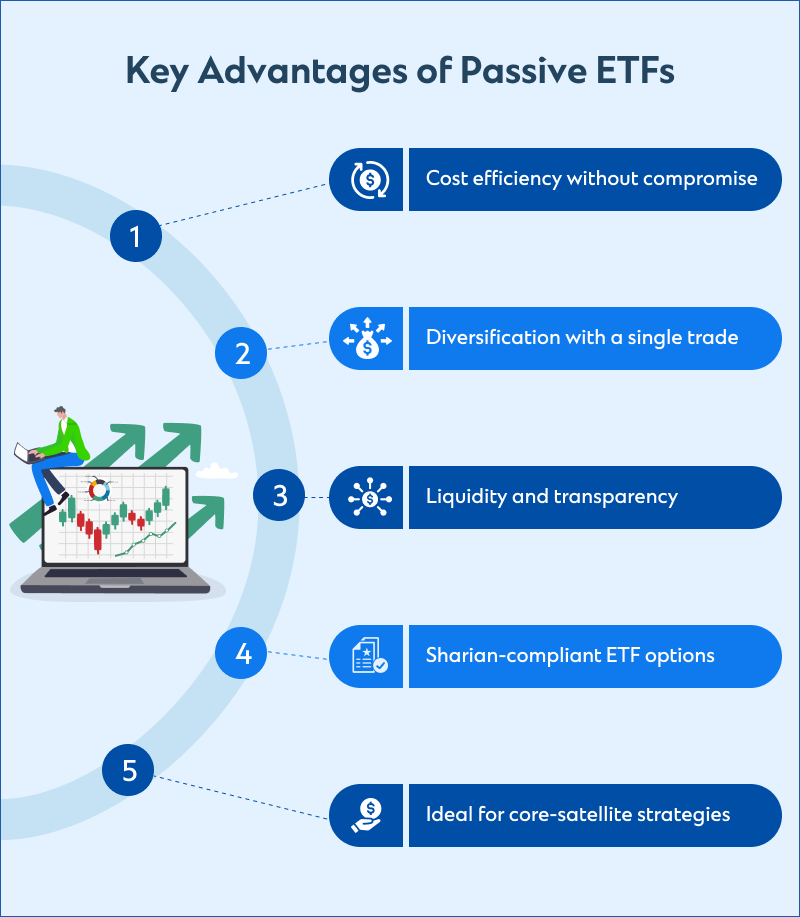

Table of Contents
In a rush? Read this summary:
- Track benchmark indices with broad exposure to equities, bonds, commodities, or Shariah-compliant assets.
- Benefit from daily liquidity and transparency, with real-time access to global and regional markets.
- Discover a range of REITs (real estate investment trusts) across the UAE and global markets, aligned with different investment themes and strategies.
As wealth managers in the UAE seek more efficient, transparent, and cost-effective investment strategies, passive Exchange-Traded Funds (ETFs) are gaining ground as a core component of sophisticated portfolios. Offering a blend of diversification, liquidity, and strategic exposure, these instruments are particularly appealing to individuals looking to optimise returns without the cost burden or complexity of active management.
Passive ETFs: A smarter route to market exposure
Passive ETFs are designed to replicate the performance of a benchmark index—such as the Morgan Stanley Capital International (MSCI) World, Financial Times Stock Exchange (FTSE) 100, or the Standard & Poor’s (S&P) UAE Domestic Shariah Index—by holding a passive ETF portfolio that mirror the index’s composition. Unlike actively managed funds, they do not aim to outperform the market. Instead, their appeal lies in minimising costs, reducing manager bias, and providing broad exposure to a specific segment of the market.
For investors in the UAE, this low-cost access to global and regional indices makes passive ETFs a compelling alternative to traditional mutual funds or direct equity positions. Whether listed on Nasdaq Dubai, Dubai Financial Market (DFM), or international exchanges, ETFs offer seamless access to equities, bonds, commodities, and even Shariah-compliant strategies.
Key advantages of passive ETFs for UAE-based investors
1. Cost efficiency without compromise
One of the most attractive features of passive ETFs is their low expense ratios. Without the need for active decision-making, portfolio turnover is reduced and management fees are lower—typically ranging between 0.05% to 0.50%, compared to over 1.5% for actively managed funds.
For high-net-worth (HNW) investors, this cost efficiency translates into significant savings over the long term, especially when deploying large capital across multi-asset portfolios.
2. Diversification with a single trade
Passive ETFs allow investors to gain diversified exposure through a single instrument. This is particularly beneficial in markets like the UAE, where concentrated exposure to local real estate or energy sectors can introduce unnecessary risk.
For example, a single ETF tracking the MSCI Emerging Markets Index provides access to over 1,000 companies across 20+ countries—far beyond what most portfolios can achieve manually.
3. Liquidity and transparency
Unlike traditional unit trusts or mutual funds that are priced once a day, ETFs trade like stocks on an exchange. This transparency and flexibility are major draws for UAE investors embracing passive investing.
Embracing passive ETF investing empowers UAE investors with an efficient, disciplined and globally diversified approach to passive earning.
4. Shariah-compliant ETF options
Islamic investors in the UAE benefit from the availability of Shariah-compliant passive ETFs. Shariah-compliant passive ETFs—available on international platforms—offer exposure aligned with Islamic finance principles. Examples include ETFs tracking global sukuk indices or Islamic equity screens. Investors should consult with their relationship manager to explore Shariah-aligned options available through their UAE-based wealth platforms.
5. Ideal for core-satellite strategies
For portfolio construction, many UAE wealth experts advocate a “core-satellite” approach—where the core is built with low-cost, stable assets (like passive ETFs), while satellites consist of more tactical or high-conviction bets (like private equity or actively managed funds).
Passive ETFs offer a reliable and efficient building block for the core, allowing investors to maintain discipline while selectively pursuing alpha.

Tailoring passive ETF strategies to your wealth goals
Whether your goal is long-term capital appreciation, income generation, or capital preservation, passive ETFs can be customised to suit varying risk appetites:
- Equity ETFs to capture regional or global growth (e.g., US tech, GCC blue chips)
- Equity ETFs to capture regional or global growth (e.g., US tech, GCC blue chips)
- Commodity ETFs for inflation hedging (e.g., gold-backed ETFs)
- Thematic ETFs for exposure to trends like clean energy, AI, or Islamic fintech
Investing platforms like SC Invest and other regional wealth desks now offer curated access to these instruments. As DFM and Abu Dhabi Securities Exchange (ADX) improve access to international ETFs and support dual listings, local investors can diversify globally while settling in AED or USD.
For expatriates, ETFs also offer portability and ease of rebalancing across life transitions, be it retirement, relocation, or intergenerational wealth transfer.
Investing in passive ETFs in the UAE: A smart pillar for modern wealth strategies
Passive ETFs empower UAE investors with efficient, disciplined, and globally diversified exposure without the high fees or performance risk of active management. With robust offerings now available locally and internationally, passive ETFs should no longer be viewed as a low-effort substitute, but as a cornerstone of any modern wealth strategy; it offers exactly what high-net-worth investors demand: clarity, control, and cost efficiency.
Speak to Standard Chartered’s relationship managers or contact us to learn more about investing in equities.


